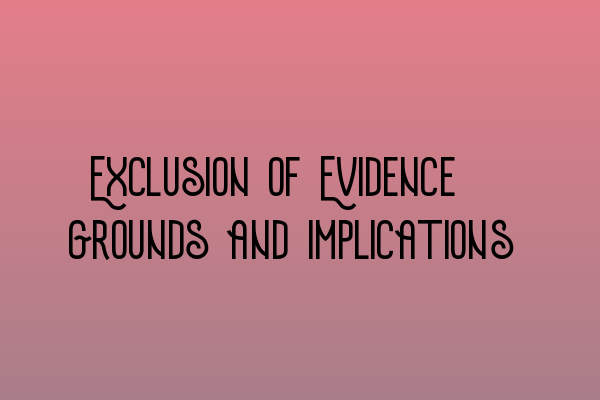Exclusion of Evidence: Grounds and Implications
Welcome to the SQE Criminal Law & Practice Law UK blog! In today’s post, we will explore the crucial topic of the exclusion of evidence in criminal proceedings. This issue holds significant importance as it directly impacts the fairness of a trial and the overall outcome of a case.
Understanding the Exclusion of Evidence
Before diving deeper into the grounds and implications of excluding evidence, it is essential to grasp the concept itself. The exclusion of evidence refers to the legal process through which certain pieces of evidence are deemed inadmissible in court. The exclusion can occur for various reasons, including violations of the defendant’s rights, improper collection methods, or lack of credibility.
As criminal defense solicitors, it is crucial for us to have a comprehensive understanding of the grounds on which evidence can be excluded. Let’s explore some of the most common grounds:
- Illegally Obtained Evidence: If evidence has been gathered in violation of the defendant’s rights, such as through illegal searches or seizures, it may be excluded from proceedings. This safeguard ensures that individuals’ rights are protected and that the justice system operates fairly.
- Unreliable or Prejudicial Evidence: Evidence that is unreliable, false, or has the potential to unfairly prejudice the jury can be excluded. This ensures that only credible and relevant evidence is presented to the court, promoting a fair trial and preventing unjust convictions.
- Breach of Legal Procedures: If the procedures followed during the collection, handling, or presentation of evidence breach legal requirements, the evidence may be excluded. This emphasizes the importance of upholding proper legal procedures to maintain the integrity of the justice system.
Implications of Excluding Evidence
The exclusion of evidence can have significant implications for both the prosecution and the defense. Let’s take a closer look:
- Weakening the Prosecution’s Case: Excluding key pieces of evidence can weaken the prosecution’s case, making it more challenging to secure a conviction. This underscores the importance of thorough and lawful evidence collection to build a strong case.
- Protecting the Defendant’s Rights: The exclusion of evidence serves as a safeguard to protect the defendant’s rights. By excluding evidence that has been unlawfully obtained or is unreliable, the justice system ensures the preservation of due process and fairness for all defendants.
- Shaping the Outcome of the Trial: Excluding certain evidence can shape the outcome of a trial. The weight and relevance of evidence play a pivotal role in determining guilt or innocence. Therefore, the exclusion of evidence can significantly impact the overall outcome of a case.
Understanding the various grounds and implications of excluding evidence is crucial for any legal practitioner involved in criminal law. If you want to delve deeper into the topic and enhance your knowledge, we recommend exploring our related articles:
- SQE 1 Practice Exam Questions
- SQE 1 Practice Mocks FLK1 FLK2
- SQE 2 Preparation Courses
- SQE 1 Preparation Courses
- SRA SQE Exam Dates
We hope this blog post has provided you with valuable insights into the exclusion of evidence, its grounds, and the implications it carries. Stay tuned for more informative articles from SQE Criminal Law & Practice Law UK!
